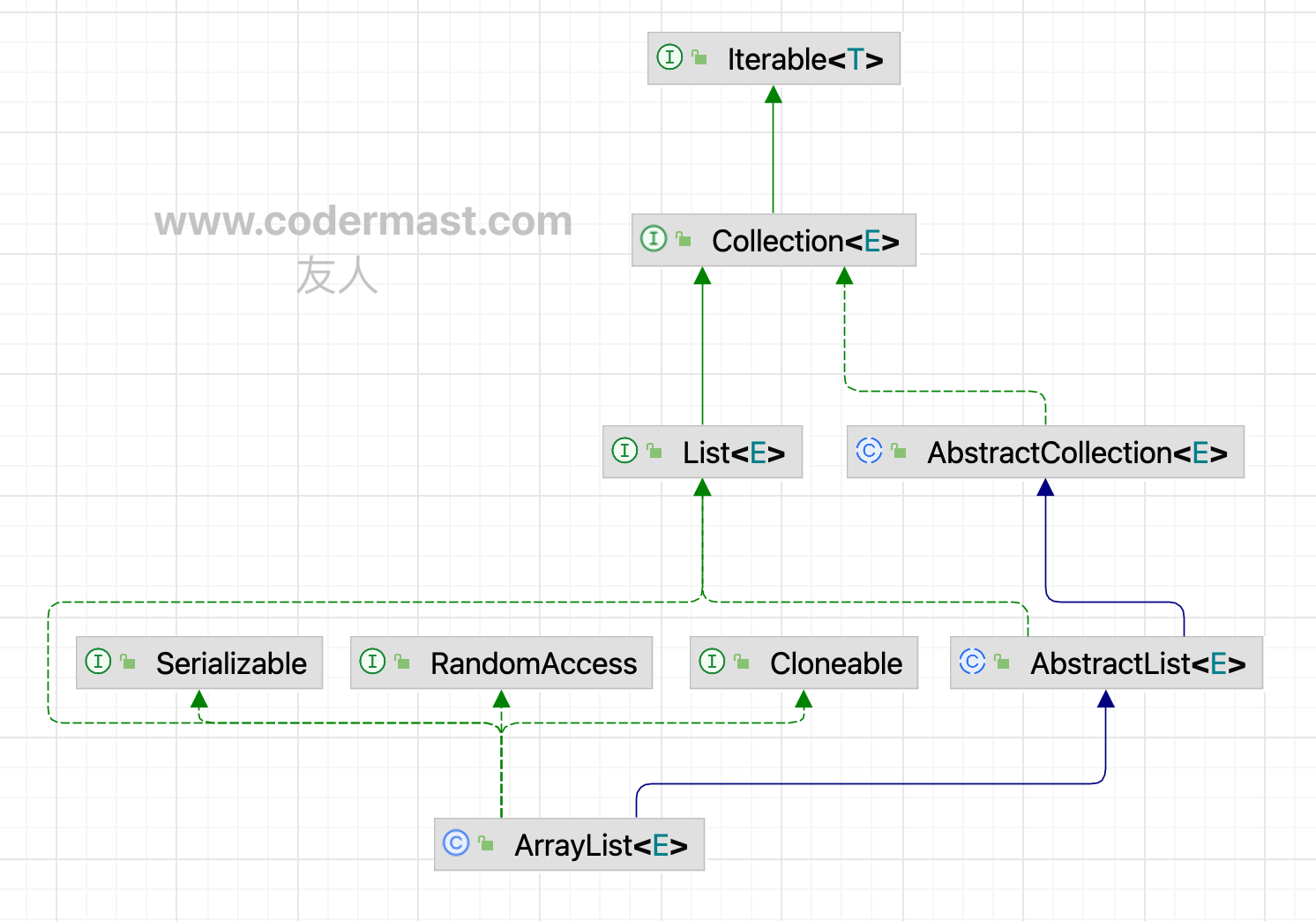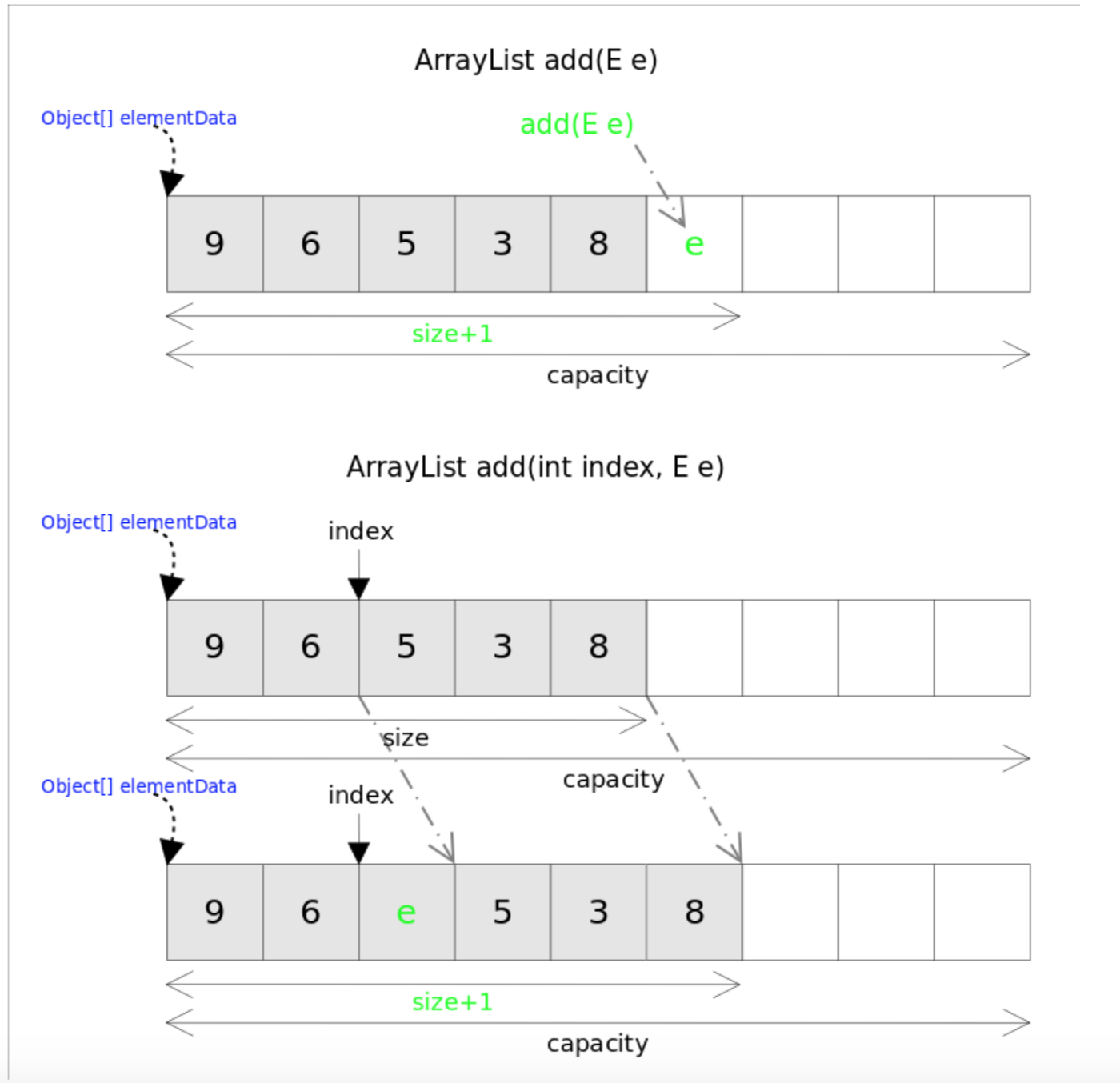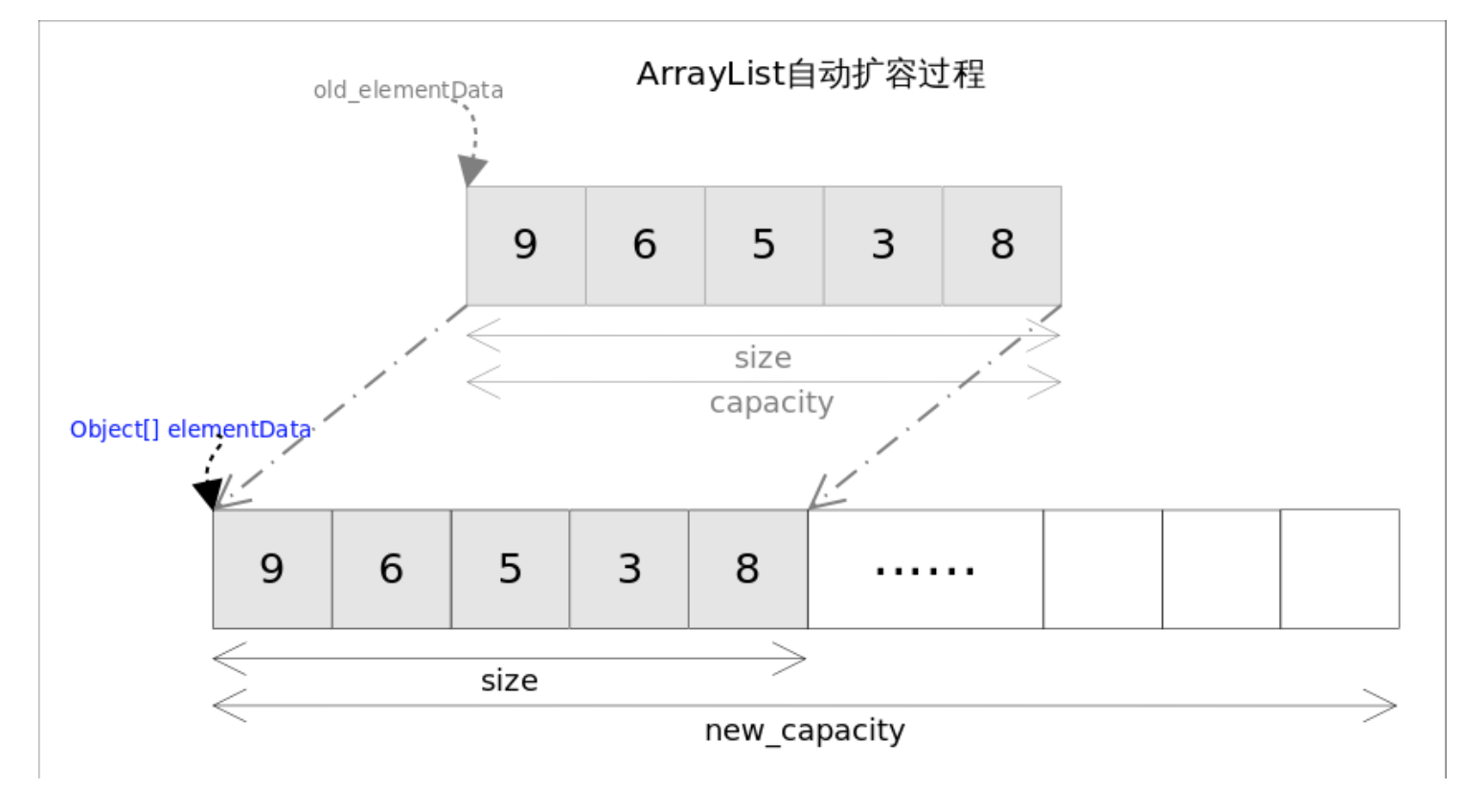List - ArrayList 源码解析
2024/3/20大约 7 分钟
List - ArrayList 源码解析

介绍
ArrayList 是 List 接口基于数组的一个实现类,故其是一个顺序集合,放入元素的顺序和实际存储的顺序是相同的,并且可以动态修改,与普通数组的区别就是它是没有固定大小的限制,我们可以添加或删除元素。
ArrayList 继承了 AbstractList ,并实现了 List 接口。
常用API
ArrayList 位于 java.util 包下,语法格式如下:
ArrayList<E> list = new ArrayList<>();
// 由于 ArrayList 是 List 接口的实现类,故常常这样使用
List<E> list = new ArrayList<>();- E : 代表想要存进 ArrayList 中的数据类型,只能是引用类型,想存基本数据类型时,使用其包装类即可。
由于无法对 ArrayList 中的底层数组进行操作,想要操作时只能通过引用去调用对应的方法进行操作。常见的方法有:
- add():增加一个元素
- addAll():增加多个元素
- set():修改元素
- remove():删除一个元素
- get():获取指定位置的元素
- toArray():获取一个转换数组
- sort():排序
- size():计算大小
- isEmpty():判断是否为空
实现方式
底层存储
/**
* The array buffer into which the elements of the ArrayList are stored.
* The capacity of the ArrayList is the length of this array buffer. Any
* empty ArrayList with elementData == DEFAULTCAPACITY_EMPTY_ELEMENTDATA
* will be expanded to DEFAULT_CAPACITY when the first element is added.
*/
// non-private to simplify nested class access
transient Object[] elementData;
/**
* The size of the ArrayList (the number of elements it contains).
*
* @serial
*/
private int size;由 ArrayList 的源码不难看出,其底层本质上还是一个数组,只不过提供了一些封装了各种操作该数组的方法,并且维护好了各项数据。
构造方法
ArrayList 集合提供了三个构造方法:分别是 无参构造法、指定容量的构造法、指定内容的构造法。
/**
* Default initial capacity.
*/
private static final int DEFAULT_CAPACITY = 10;
/**
* Constructs an empty list with the specified initial capacity.
*
* @param initialCapacity the initial capacity of the list
* @throws IllegalArgumentException if the specified initial capacity
* is negative
*/
public ArrayList(int initialCapacity) {
if (initialCapacity > 0) {
this.elementData = new Object[initialCapacity];
} else if (initialCapacity == 0) {
this.elementData = EMPTY_ELEMENTDATA;
} else {
throw new IllegalArgumentException("Illegal Capacity: "+
initialCapacity);
}
}
/**
* Constructs an empty list with an initial capacity of ten.
*/
public ArrayList() {
this.elementData = DEFAULTCAPACITY_EMPTY_ELEMENTDATA;
}
/**
* Constructs a list containing the elements of the specified
* collection, in the order they are returned by the collection's
* iterator.
*
* @param c the collection whose elements are to be placed into this list
* @throws NullPointerException if the specified collection is null
*/
public ArrayList(Collection<? extends E> c) {
Object[] a = c.toArray();
if ((size = a.length) != 0) {
if (c.getClass() == ArrayList.class) {
elementData = a;
} else {
elementData = Arrays.copyOf(a, size, Object[].class);
}
} else {
// replace with empty array.
elementData = EMPTY_ELEMENTDATA;
}
}默认容量
由该部分的源码可以看出,初始化时如果未指定容量,则默认的容量大小为10;
add方法
ArrayList 中提供了 4 个 add 方法,具体如下:
| 方法名 | 功能 |
|---|---|
| public boolean add(E e) | 实现的 List 接口内的 add 方法,添加并判断是否添加成功 |
| public void add(E e) | 添加元素 e 到列表的末尾 |
| public void add(int index, E element) | 添加元素 element 到数组的 index 位置 |
| public boolean addAll(Collection<? extends E> c) | 将指定集合 c 中的元素依次添加到列表的末尾 |
| public boolean addAll(int index, Collection<? extends E> c) | 将指定集合 c 中的元素依次添加到列表的 index 位置 |

/**
* Appends the specified element to the end of this list.
*
* @param e element to be appended to this list
* @return {@code true} (as specified by {@link Collection#add})
*/
public boolean add(E e) {
modCount++;
add(e, elementData, size);
return true;
}
public void add(int index, E element) {
rangeCheckForAdd(index);
checkForComodification();
root.add(offset + index, element);
updateSizeAndModCount(1);
}
public void add(E e) {
checkForComodification();
try {
int i = cursor;
ArrayList.this.add(i, e);
cursor = i + 1;
lastRet = -1;
expectedModCount = modCount;
} catch (IndexOutOfBoundsException ex) {
throw new ConcurrentModificationException();
}
}
/**
* Appends all of the elements in the specified collection to the end of
* this list, in the order that they are returned by the
* specified collection's Iterator. The behavior of this operation is
* undefined if the specified collection is modified while the operation
* is in progress. (This implies that the behavior of this call is
* undefined if the specified collection is this list, and this
* list is nonempty.)
*
* @param c collection containing elements to be added to this list
* @return {@code true} if this list changed as a result of the call
* @throws NullPointerException if the specified collection is null
*/
public boolean addAll(Collection<? extends E> c) {
Object[] a = c.toArray();
modCount++;
int numNew = a.length;
if (numNew == 0)
return false;
Object[] elementData;
final int s;
if (numNew > (elementData = this.elementData).length - (s = size))
elementData = grow(s + numNew);
System.arraycopy(a, 0, elementData, s, numNew);
size = s + numNew;
return true;
}
/**
* Inserts all of the elements in the specified collection into this
* list, starting at the specified position. Shifts the element
* currently at that position (if any) and any subsequent elements to
* the right (increases their indices). The new elements will appear
* in the list in the order that they are returned by the
* specified collection's iterator.
*
* @param index index at which to insert the first element from the
* specified collection
* @param c collection containing elements to be added to this list
* @return {@code true} if this list changed as a result of the call
* @throws IndexOutOfBoundsException {@inheritDoc}
* @throws NullPointerException if the specified collection is null
*/
public boolean addAll(int index, Collection<? extends E> c) {
rangeCheckForAdd(index);
Object[] a = c.toArray();
modCount++;
int numNew = a.length;
if (numNew == 0)
return false;
Object[] elementData;
final int s;
if (numNew > (elementData = this.elementData).length - (s = size))
elementData = grow(s + numNew);
int numMoved = s - index;
if (numMoved > 0)
System.arraycopy(elementData, index,
elementData, index + numNew,
numMoved);
System.arraycopy(a, 0, elementData, index, numNew);
size = s + numNew;
return true;
}get方法
ArrayList 中 get 方法只有一种实现:public E get(int index) 获取指定下标的元素
/**
* Returns the element at the specified position in this list.
*
* @param index index of the element to return
* @return the element at the specified position in this list
* @throws IndexOutOfBoundsException {@inheritDoc}
*/
public E get(int index) {
rangeCheck(index);
return elementData(index);
}set方法
set 方法的功能为,修改指定下标的元素为 element。
/**
* Replaces the element at the specified position in this list with
* the specified element.
*
* @param index index of the element to replace
* @param element element to be stored at the specified position
* @return the element previously at the specified position
* @throws IndexOutOfBoundsException {@inheritDoc}
*/
public E set(int index, E element) {
rangeCheck(index);
E oldValue = elementData(index);
elementData[index] = element;
return oldValue;
}remove方法
ArrayList 中的 remove 方法有两个实现:
- public E remove(int index):删除指定下标的元素
- public boolean remove(Object o):删除第一个匹配成功的指定对象
/**
* Removes the element at the specified position in this list.
* Shifts any subsequent elements to the left (subtracts one from their
* indices).
*
* @param index the index of the element to be removed
* @return the element that was removed from the list
* @throws IndexOutOfBoundsException {@inheritDoc}
*/
public E remove(int index) {
rangeCheck(index);
modCount++;
E oldValue = elementData(index);
int numMoved = size - index - 1;
if (numMoved > 0)
System.arraycopy(elementData, index+1, elementData, index,
numMoved);
elementData[--size] = null; // clear to let GC do its work
return oldValue;
}
/**
* Removes the first occurrence of the specified element from this list,
* if it is present. If the list does not contain the element, it is
* unchanged. More formally, removes the element with the lowest index
* <tt>i</tt> such that
* <tt>(o==null ? get(i)==null : o.equals(get(i)))</tt>
* (if such an element exists). Returns <tt>true</tt> if this list
* contained the specified element (or equivalently, if this list
* changed as a result of the call).
*
* @param o element to be removed from this list, if present
* @return <tt>true</tt> if this list contained the specified element
*/
public boolean remove(Object o) {
if (o == null) {
for (int index = 0; index < size; index++)
if (elementData[index] == null) {
fastRemove(index);
return true;
}
} else {
for (int index = 0; index < size; index++)
if (o.equals(elementData[index])) {
fastRemove(index);
return true;
}
}
return false;
}自动扩容
每次向数组中添加元素时,都会去检查添加元素的个数是否会超过当前数组的长度,如果超出,数组则会进行扩容,直到满足添加数据的需求为止。ArrayList 中的扩容是通过 ensureCapacity(int minCapacity) 方法,实际执行扩容的过程是通过调用 grow(int minCapacity) 方法来实现的。每次扩容后会变为原来容量的 1.5 倍。
扩容过程为:
- 当添加元素时,首先会检查当前数组的容量是否足够存放新元素。如果容量不够,则会执行扩容操作。
- 扩容操作会创建一个新的数组,通常是原来容量的 1.5 倍大小。
- 然后将原数组中的元素复制到新数组中。
- 最后,将新数组设置为 ArrayList 的内部数组,以替代原来的数组。

/**
* Increases the capacity of this <tt>ArrayList</tt> instance, if
* necessary, to ensure that it can hold at least the number of elements
* specified by the minimum capacity argument.
*
* @param minCapacity the desired minimum capacity
*/
public void ensureCapacity(int minCapacity) {
int minExpand = (elementData != DEFAULTCAPACITY_EMPTY_ELEMENTDATA)
// any size if not default element table
? 0
// larger than default for default empty table. It's already
// supposed to be at default size.
: DEFAULT_CAPACITY;
if (minCapacity > minExpand) {
ensureExplicitCapacity(minCapacity);
}
}
private void ensureCapacityInternal(int minCapacity) {
ensureExplicitCapacity(calculateCapacity(elementData, minCapacity));
}
private void ensureExplicitCapacity(int minCapacity) {
modCount++;
// overflow-conscious code
if (minCapacity - elementData.length > 0)
grow(minCapacity);
}
/**
* Increases the capacity to ensure that it can hold at least the
* number of elements specified by the minimum capacity argument.
*
* @param minCapacity the desired minimum capacity
*/
private void grow(int minCapacity) {
// overflow-conscious code
int oldCapacity = elementData.length;
int newCapacity = oldCapacity + (oldCapacity >> 1);
if (newCapacity - minCapacity < 0)
newCapacity = minCapacity;
if (newCapacity - MAX_ARRAY_SIZE > 0)
newCapacity = hugeCapacity(minCapacity);
// minCapacity is usually close to size, so this is a win:
elementData = Arrays.copyOf(elementData, newCapacity);
}